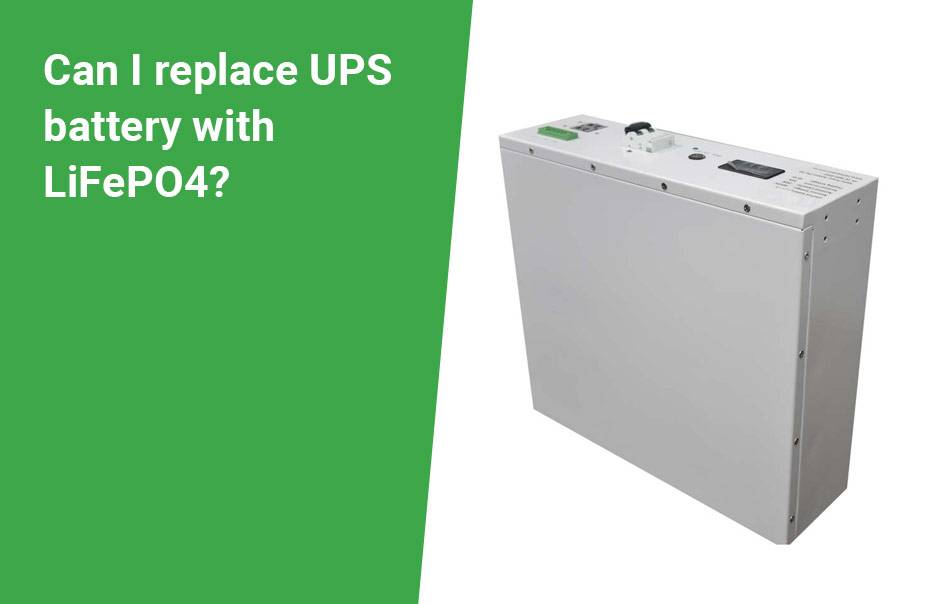
Blog
Can I Replace UPS Battery with LiFePO4?

Yes, you can replace traditional uninterruptible power supply (UPS) batteries with lithium iron phosphate (LiFePO4) batteries, which offer several advantages, including longer lifespan, faster charging, and improved safety. However, compatibility with your specific UPS model and proper charging management are crucial for successful integration.
What Are the Benefits of Replacing UPS Batteries with LiFePO4?
Replacing UPS batteries with LiFePO4 offers numerous benefits:
- Longer Lifespan: LiFePO4 batteries typically last longer than traditional lead-acid batteries, often exceeding 10 years.
- Higher Efficiency: They charge faster and can discharge more efficiently, providing better performance during power outages.
- Safety: LiFePO4 chemistry is known for its thermal stability and lower risk of thermal runaway compared to other lithium-ion chemistries.
Chart: Benefits of LiFePO4 Batteries
| Benefit | Description |
|---|---|
| Longer Lifespan | Lasts up to 10 years or more |
| Higher Efficiency | Faster charging and discharging capabilities |
| Enhanced Safety | Lower risk of overheating and thermal runaway |
How Do You Ensure Compatibility When Using LiFePO4 in a UPS?
To ensure compatibility when replacing your UPS battery with a LiFePO4 battery:
- Check Voltage Requirements: Ensure the voltage output of the LiFePO4 battery matches that of the original battery.
- Evaluate Charging System: Confirm that your UPS charger can accommodate the charging profile of a LiFePO4 battery.
- Consult Manufacturer Specifications: Review your UPS manual or consult the manufacturer to verify compatibility.
Chart: Compatibility Checklist
| Factor | Requirement |
|---|---|
| Voltage | Match original battery voltage |
| Charger Type | Compatible with LiFePO4 charging profile |
| Manufacturer Guidance | Follow recommendations from UPS manufacturer |
What Are the Charging Requirements for LiFePO4 Batteries in UPS Systems?
LiFePO4 batteries have specific charging requirements that differ from traditional lead-acid batteries:
- Charging Voltage: Typically requires a higher charging voltage (around 14.6V) to fully charge.
- Charging Current: Ensure that the UPS can provide adequate current without exceeding the battery’s specifications.
- Battery Management System (BMS): A good BMS is essential to manage charging cycles and protect against overcharging.
Chart: Charging Requirements for LiFePO4
| Requirement | Specification |
|---|---|
| Charging Voltage | Approximately 14.6V |
| Recommended Current | Must not exceed battery specifications |
| BMS | Essential for safe operation |
Which UPS Models Are Suitable for LiFePO4 Battery Replacement?
Not all UPS models are compatible with LiFePO4 batteries. Suitable models often include:
- APC Smart-UPS Series: Many models can be upgraded if they have adjustable charging settings.
- CyberPower Units: Certain models are designed to work with lithium batteries.
- Eaton UPS Systems: Some Eaton models support lithium-ion replacements.
Chart: Compatible UPS Models
| Model | Manufacturer | Notes |
|---|---|---|
| APC Smart-UPS SUA1500i | APC | Requires confirmation of voltage settings |
| CP1500PFCLCD | CyberPower | Compatible with drop-in lithium replacements |
| 5P Series | Eaton | Check specifications for lithium compatibility |
What Safety Considerations Should Be Taken into Account?
When replacing your UPS battery with a LiFePO4 option, consider these safety aspects:
- Overcharging Risks: Ensure your charger is compatible to avoid overcharging, which can damage the battery or create hazards.
- Proper Installation: Follow installation guidelines carefully to prevent short circuits or incorrect connections.
- Monitoring Performance: Regularly check the performance of the new battery to ensure it operates safely within specified limits.
Chart: Safety Considerations
| Safety Aspect | Description |
|---|---|
| Overcharging Risks | Use compatible chargers to prevent damage |
| Installation Guidelines | Follow manufacturer instructions closely |
| Performance Monitoring | Regularly assess battery health and performance |
Tips for Battery Wholesale Buyers: How to Choose a Reliable Manufacturer?
When considering wholesale purchases or OEM orders for batteries, it’s crucial to choose a reliable manufacturer. Here are some tips:
- Research Manufacturer Reputation: Look for established companies like Redway Power, known for quality and reliability.
- Evaluate Product Range: Ensure they offer various battery types suitable for your needs.
- Check Certifications: Confirm compliance with industry standards.
For OEM orders from a reputable manufacturer like Redway Power, which has over 13 years of experience in lithium battery manufacturing, ensure clear communication regarding specifications and delivery timelines. This approach helps secure high-quality products that serve as excellent alternatives to lead-acid batteries.
Redway Power Expert Views
“Switching to LiFePO4 batteries in your UPS system can significantly enhance performance and longevity. However, it’s essential to ensure compatibility and proper charging management to maximize safety and efficiency,” states an expert from Redway Power.
FAQ Section
- Can I replace my UPS battery with a LiFePO4?
Yes, you can replace traditional batteries with LiFePO4, but ensure compatibility with your specific UPS model. - What should I check before replacing my battery?
Verify voltage requirements, charger compatibility, and consult manufacturer specifications. - Are there any safety concerns when using LiFePO4 in a UPS?
Yes, ensure proper installation and monitor performance to avoid overcharging risks.



